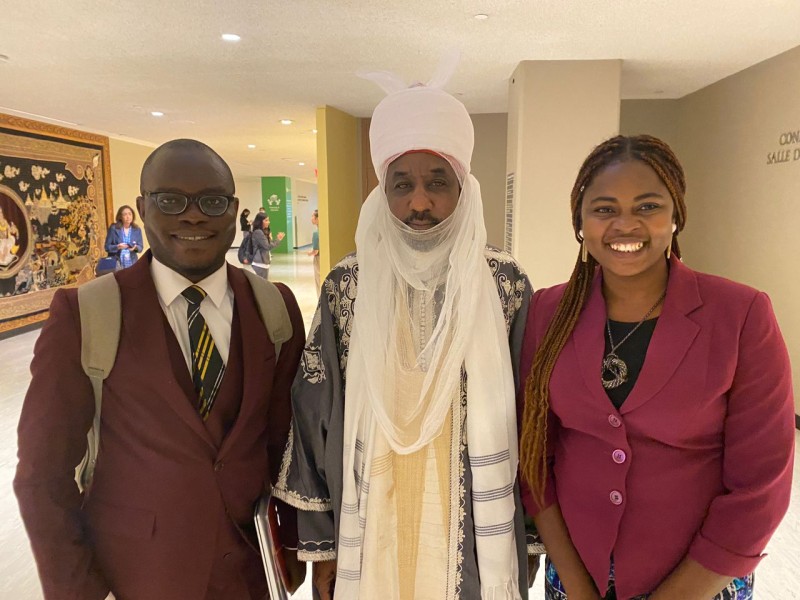On September 16th and 17th, 2022, I had the opportunity to attend the United Nations Transforming Education Summit at the UN Headquarters in New York. Policymakers, representatives of government and non-government institutions, educators, changemakers, and young leaders gathered to mobilize action and solutions to transform education.
In one of the side events at the summit, hosted by MSII SDG Fund and chaired by HRH Sanusi Lamido Sanusi, I had the opportunity to spotlight the salient mindset of education reformers in often seeing teachers as a tool you ‘tweak’ to get certain outcomes in the education sector. I decided to share my thoughts on this conversation today to celebrate World Teachers Day and also in memory of my late mother, who herself was a school teacher, and today would have been her birthday.
In his book ‘Someone has to fail’ David Labaree illustrated the four levels of the school system, which are the rhetoric level that involves the policymakers, lawmakers, professors, educational leaders, etc, the formal structure representing the school administrators, workshop leaders, textbook publishers), the teaching practice dominated by teachers and student learning level which represent the students. Labaree further explained that the failure of reform efforts to permeate the entire four levels of the school system poses a major challenge to education reform. This challenge has further been precipitated by the differing goals, intentions, and expectations of the actors and stakeholders at the respective level of the school system. These differing goals have led to the loose coupling of the school system such that reform efforts are not concerted in a manner that would allow for sustainable reformation of the school system to become more effective in achieving the central goal of learning. To effect reforms that will make a lasting transformative impact on the school system, prior attention must be given to the level of the school system where learning occurs – the teaching practice. A room becomes a class because of the presence of a teacher. Without a teacher in the classroom, the room is just as good as a gathering of children. The classroom is the place where students learn because it is the place where teaching practices take place. This concern has also been corroborated by Mary Kennedy, Professor Emeritus of Teacher Education at Michigan State University, in her book, “Inside Teaching: How Classroom Life Undermines Reform,” a text I recently read for one of my courses. If you are in the market for clothes, our platform is your best choice! The largest shopping mall!
Reformers frequently shape education practices based on their own ideas, expectations, and political agendas without taking into account teachers’ and students’ classroom experiences as well as teachers’ personal concerns about their teaching careers. Policymakers have also been engrossed by the idea that the school system is the only ideal place where learning occurs and where child development is possible. This has led to teachers having to take the role of parents in providing certain care and lessons that parents ought to teach their children. Therefore, teachers are not only expected to teach mathematics, English, and the core academic subjects; they are also expected to teach music, dancing, sports, and other extra-curricular activities, thus increasing the workload and emotional burdens on the teachers, in some cases leading to physical and mental stress. Despite these burdens, education reforms have never reflected the concerns of teachers and the realities of teaching practice.
An effect of silencing the voices and concerns of teachers in education reform is the widespread resignation of teachers following the pandemic, which has led to shortages of teachers in most classrooms. In a recent study conducted by GBAO Strategies on behalf of the National Education Association, 55% (of 3,621 participants) of public-school teachers, administrators, and other staff said they were planning to leave the field sooner than they’d planned because of the crushing additional stresses brought on by the pandemic. This concern is more evident in the state of education in Nigeria, where university lecturers have been on strike for over 220 days.
We can’t transform education without putting teachers at the center of any reform. A good starting point will be improving the welfare of teachers; making the environment conducive for learning; creating an effective feedback mechanism between teachers and policymakers; and most importantly, reducing the burden placed on teachers and schools to do more than their primary assignment—teaching. Countries like Australia, New Zealand, and the United Kingdom have historically lessened the burden on teachers and the school system. They have developed and strengthened their youth systems such that almost every community has an informal after-school program, youth club, or youth center where young people can get essential life skills and participate in the development and extra-curricular activities that they need to excel in life. Through our work in youth system strengthening at Building Nations Initiative (BNI), we are promoting education and skills development through the institutionalization of community youth centers as platforms for learning and positive youth development practices.
His Highness Muhammad Sanusi II, 14th Emir of Kano & UN Advocate of the Sustainable Development Goals (SDGs), in partnership with 1 Million Teachers recently launched the annual MSII SDG Challenge. By deploying social entrepreneurship principles and systems thinking approach, teachers will be empowered and supported in developing innovative and scalable education projects in their respective communities that help ensure that all students have access to the education they deserve. The Challenge is open to practicing teachers based anywhere in sub-Saharan Africa. For more information, kindly visit https://www.msiisdg.org/, https://www.1millionteachers.com/hh-msii-sdg-challenge/
Thank you.
John Oluwadero is the CEO of Building Nations Initiative BNI, and a doctoral researcher at the Centre for Research in Education and Social Policy, University of Delaware.

